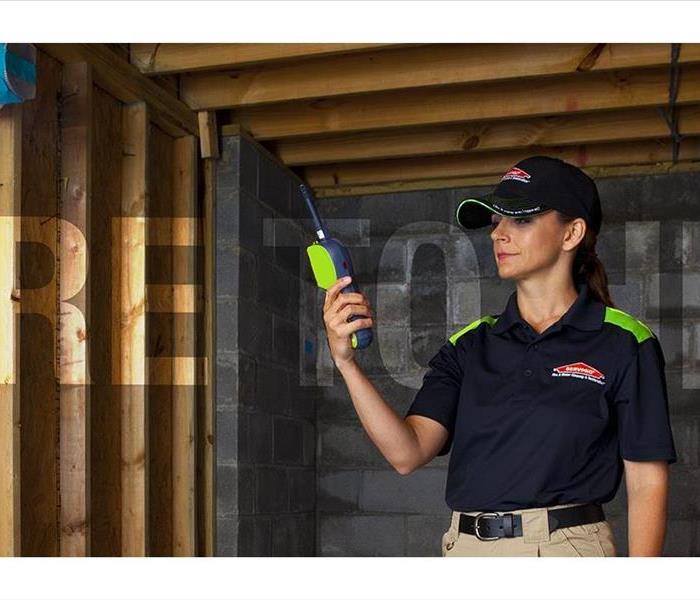West Fort Worth Biohazard Cleanup Specialists Make Homes Safe
5/13/2020 (Permalink)
Summary: SERVPRO of West Fort Worth cleans up biohazards quickly, safely, and according to guidelines. Highly-qualified, skilled, and well-equipped technicians make a biohazard site safe again as quickly as possible.
The Dallas-Fort Worth area is one of the fastest-growing regions in the United States. Every four minutes, a person moves to the area — around fifteen per hour, over 360 per day, and almost 2400 per week. The North Texas area includes 13 counties, over 150 cities, and 7.4 million people.
The greater Dallas-Fort Worth metropolitan area is also a hub of business, industry, and biotechnology. The greater Dallas-Fort Worth region is a major center of healthcare and medical innovations. The biotechnical community is estimated at over 1,100 research, development, and testing laboratories and more than 450 biomedical companies. Over 30,000 businesses from every research, technology, manufacturing, industrial, and service sector call the area home. With a growing population and one of the strongest business and investment environments in the nation and the world, the Dallas-Fort Worth area needs to have 24/7 access to professional, knowledgeable, and certified biohazard cleanup services.
What Is Biohazard Cleanup?
Biohazard is an umbrella term for biological substances, solutions, liquids, and materials that are harmful or lethal to living organisms. For homeowners, businesses, and commercial property owners around the Dallas-Fort Worth area, biohazards can present serious health and safety challenges.
Biohazards can be found almost anywhere. Commercial property owners should be acutely aware of the necessity to be cautious around biohazard situations. Failure to observe proper handling and removal procedures may lead to personal injury, death, lawsuits, and EPA and OSHA violations. These violations may result in fines, or worse.
Homeowners are not exempt from the danger of biohazards. Asbestos, lead, toxic chemical spills from a previous resident, sewage spills, animal feces or remains, and narcotic residue or paraphernalia are some examples of very toxic situations that people may encounter.
Examples of Biohazards
The decontamination of a home or business due to biohazards can be both dangerous and emotionally traumatic. Specialized training and experience are essential to consider when selecting a company to clean up the biohazard.
Whether a residence, a business, or a commercial property, it is important to know what constitutes a biohazard. Some situations present a threat of injury or death if improperly handled. Other biohazard situations present legal challenges. A competent, certified professional biohazard specialist can identify and rate a biohazard and present solutions that are safe, secure, and meet legal requirements for site management, clean up, and disposal of biohazards.
Examples of biohazards include the following:
- Sewage backups
- Crime scene residues
- Suicide/death accidents
- Homicide cleanups
- Blood cleanup
- Accident cleanup
- Hoarding scenes
- Animal bedding/waste/remains
- Chemical spills
- Vandalism cleanups involving toxic substances
- Tear gas cleanup
- Meth lab cleanup
- Microbiological cleanup
- Lab cleanup: sharps (needles), glass slides, scalpels, etc.
There are different kinds of biohazards. Some of these examples may never present themselves in a home or business. While a home or commercial property may not be exposed to as many biohazards as other places, it is still vulnerable.
Levels of Biohazard
There are four biohazard threat levels:
- Level One: This level includes E. Coli, Bacillus subtilis, and more. The danger level is low, posing only a minimal threat to people, animals, and the environment.
- Level Two: This level includes HIV, Hepatitis B, and Salmonella. Level two biohazards are contracted through contact with any infected materials and can make people extremely ill.
- Level Three: This level includes tuberculosis and other airborne pathogens which expose people to serious illnesses.
- Level Four: This level includes biohazards that pose the highest threat. Diseases they cause, such as the Ebola and Lassa viruses, have no treatments and could be life-threatening. For threats of this severity, it is recommended to contact the nearest EPA office for help. Failure to handle high-level biohazards in a manner that is safe, secure, and according to regulatory guidelines could lead to illness, injury, death, fines, or litigation.
What to Do When a Biohazard Event Occurs
If biohazard exposure occurs or is discovered in the home, business, or commercial property, it needs to be resolved immediately. Most levels need specialty cleaning services. These companies are trained to solve the problem quickly, safely, efficiently, and according to guidelines. SERVPRO of West Fort Worth is a 24/7 company that specializes in cleaning up many levels of biohazard exposure. They comply with health regulations and have the equipment needed for safe clean up, collection, removal, and disposal. They will decontaminate a home, business, or commercial property in the event of trauma, chemical spills, sewage backups, hoarding, and more.
To contact a biohazard cleanup specialist nearby, call SERVPRO of West Fort Worth, Texas, at (817) 560-3086.






 24/7 Emergency Service
24/7 Emergency Service
